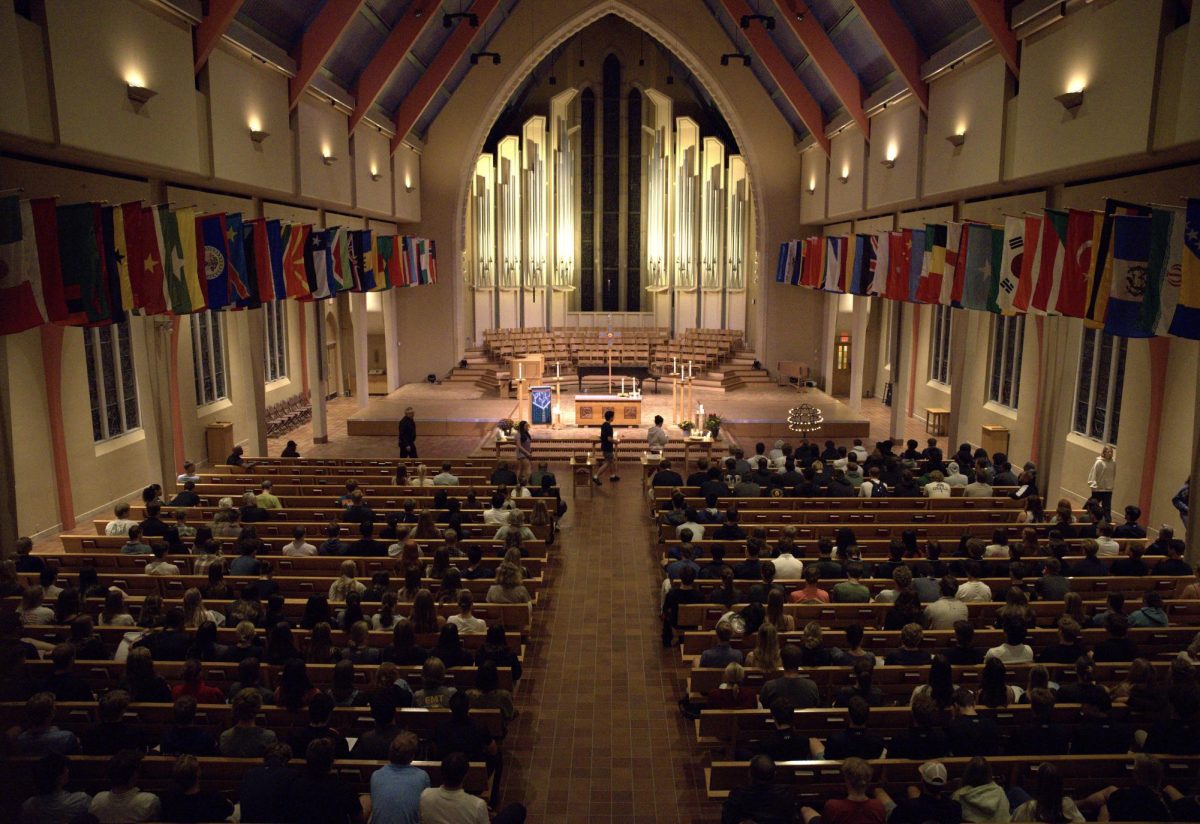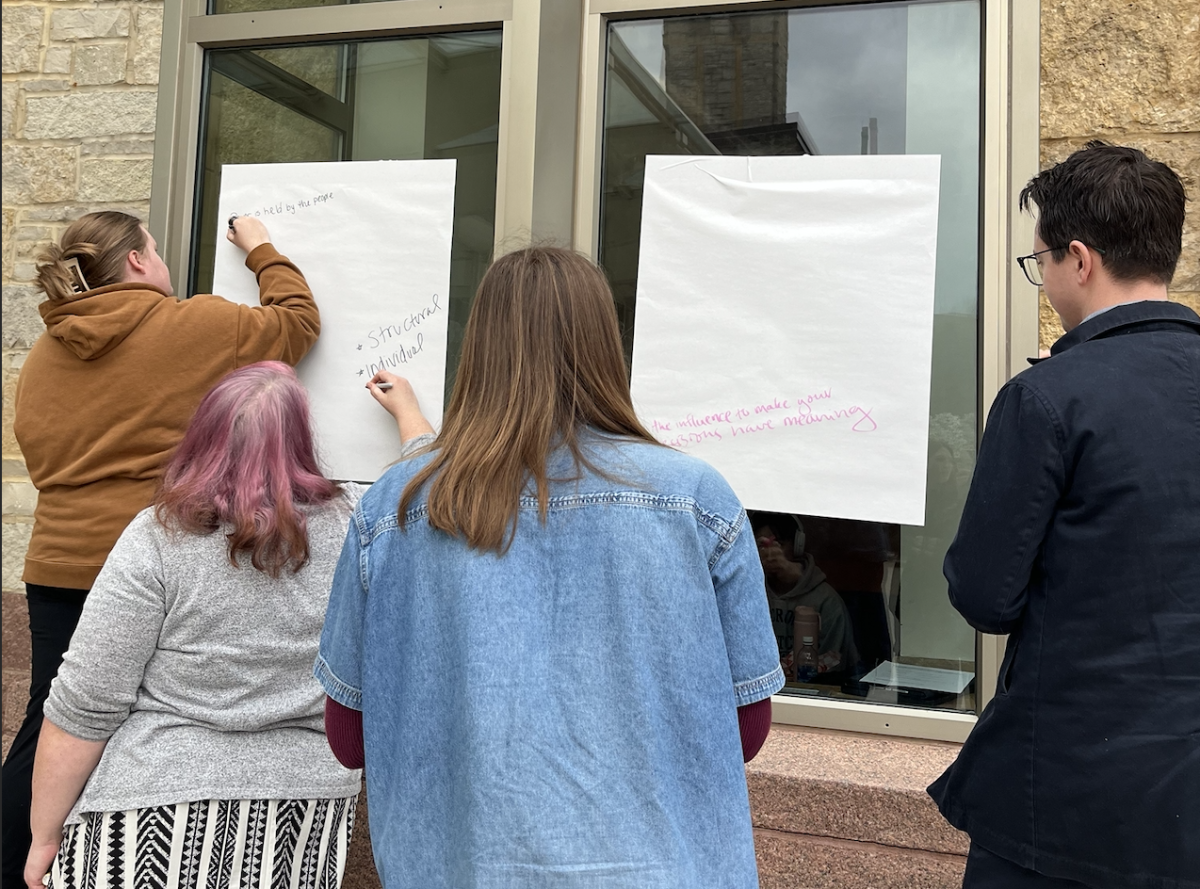UPDATED: This story has been edited to clarify campus organizations support of the proposal. At the Senate meeting, Dean said that the Wellness Center, Health Services, Cancer Connections,GLOW!, Environmental Coalition and the St. Olaf Nursing Department supported her proposal. Dean has since stated that she was in communication with the above organizations and that the Wellness Center, GLOW! and Environmental Coalition have declined to take a position. The Wellness Center supports cultivating a dialogue surrounding the issue, but wants to remain impartial regarding the proposal. GLOW! is not taking a stance on the issue, nor is Environmental Coalition.
On Tuesday, Feb. 12, the Student Government Association SGA Senate passed a proposal 20 to 6 to place a referendum gauging students’ support for a tobacco-free campus on the SGA Spring Election ballot.
Nursing major Rachel Dean ’13 brought the proposal before Senate. Dean’s aim, she explained at the meeting, is to revive the efforts of Shannon Pitt ’11, a nursing student who proposed a similar referendum. At that time, the students voted, and, according to Vice President Greg Kneser, support for a tobacco-free campus was about 50 percent.
In addition to the senators and some administrators, the walls of the David E. Johnson boardroom were lined with students eager to hear Dean’s proposal and express their own views to the senators before the vote. About 25 students attended, a much higher turnout thanusual for the weekly Senate meetings.
With slides on the projector and a three-ring binder in hand, Dean presented to Senate her argument for a smoke-free campus.
According to Dean, there are already 800 tobacco-free campuses in the country. Banning smoking on St. Olaf and Carleton campuses is a goal supported by the Rice County Public Health Department, Dean said.
At the Senate meeting, Dean said that her proposal has the support of the Wellness Center, Health Services, Cancer Connections,GLOW!, Environmental Coalition and the St. Olaf Nursing Department. Since the meeting, Dean stated that she was merely in communication with these organizations. The Wellness Centersupports cultivating a dialogue surrounding the issue, but wants to remain impartial regarding the proposal. GLOW! is not taking a stance on the issue, nor is Environmental Coalition.
At the Senate meeting, Dean’s central argument was simple: Smoking is dangerous and should not be allowed.
“According to the Surgeon General,” she said, “there is no safe level of secondhand smoke.” She also discussed the inclusion of tobacco cessation resources in the implementation of a smoking ban.
“Believe me, a lot of consideration hasgone into the ethics of it all,” Dean said. She concluded by noting that her proposed ban is not intended to discriminate against tobacco users, but rather aims to allow St. Olaf to take a stand as a community. She believes the ban will “reflect the student body’s values.”
When Dean’s presentation concluded, the discussion intensified, first with questions from the senators themselves followed by an open student comment portion.
Sen. Andrew Sather ’14 opened thequestion portion by asking Dean if she had any information on the effects of secondhand smoke on students in a college campus setting. Dean did not have any information, but she reiterated that there is no safe level of secondhand smoke.
Next, Sen. Kari Swanson ’13 raised a popular point of concern among those inattendance. Banning smoking completely could be perceived as ostracizing smokers, Swanson said. She wondered whether Dean had considered the idea of designating sequestered areas for smoking on campus.
Dean replied that she was not interested in a compromise; her only goal is to remove smoking entirely.
After more discussion about the current rules smokers must be 25 feet from a building, the floor was opened to students to ask questions and make comments.
St. Olaf smokers and their allies asked the Senate to consider all of the reasons that the referendum would be harmful to the campus. The students peppered the Senate with appeals to logic, their personal stories and questions of the ethics of Dean’s proposal.
“Taking away choice is unethical,” said Paul Cathey ’13, adding that campus smokers know the risks. Banning smoking will only encourage people to hide the behavior, not stop it, he said.
Robin Cole ’13 asked her peers to consider the fact that a smoking ban would affect not only students, but also the members of the St. Olaf community who prepare food, keep our buildings safe and take care of daily operations. Their interests matter too, Cole argued.
Wellness Center Peer Educator Lynna Long ’13 stood up on behalf of the current smoking rules, saying that forcing people to quit smoking is not the answer – and in many cases, it will not work.
“If the goal is to truly help cessate [sic] smoking, the right idea is to enforce the rules we have,” she said.
Other students mentioned that a ban on smoking would be at odds with St. Olaf’s emphasis on community. After all, many argued, “the smokers” represent one of the many social microcosms that blend together to make the rich community of St. Olaf.
After 13 students spoke, Dean’s proposal was placed before the Senate. Dean requested an amendment to her initial proposal. The original proposal specifically called for a referendum that would pass with 75 percent of the student body’s support. She requested to amend the proposal so it would read, “SGA supports the discussion of making St. Olaf a tobacco-free campus.”
The senators discussed this amendment to the proposal, deliberating on what their role would be in executing it. Most did not support the amendment.
“I don’t think [the referendum] will pass, but I think the way to foster discussion is to go forward with the original proposal,” Sen. Timothy Lillehaugen ’13 said.
Sen. Nick Stumo-Langer ’15 added that the only way to find out how students truly feel about the issue is to force them to talk about it.
“We have students who know about both sides of the issue very well,” Stumo-Langer said. Other senators echoed these sentiments, and the amendment was voted down.
Now, the original proposal was back up for discussion. Despite Dean’s readiness to give up on the original proposal, many of the senators fought for it, arguing that the only way to truly understand student opinion was to hold the referendum.
Sen. Rachel Braun ’13 offered yet another amendment to Dean’s original proposal, moving that the referendum be purely to gauge student opinion and provide Dean with that information, rather than to necessarily send a message to the college administration.
After another 15 minutes of deliberation, which consisted largely of discussion on the exact wording that ought to be used, Braun’s amendment and the proposal itself passed with a vote of 20 to 6.
The referendum reads: “We, as a community, support a tobacco-free environment at St. Olaf College.”
After an excitement- and drama-filled evening, it is still uncertain what will ultimately become of on-campus smoking regulations. But for the time being, students can expect to have their voices heard during elections next month.


